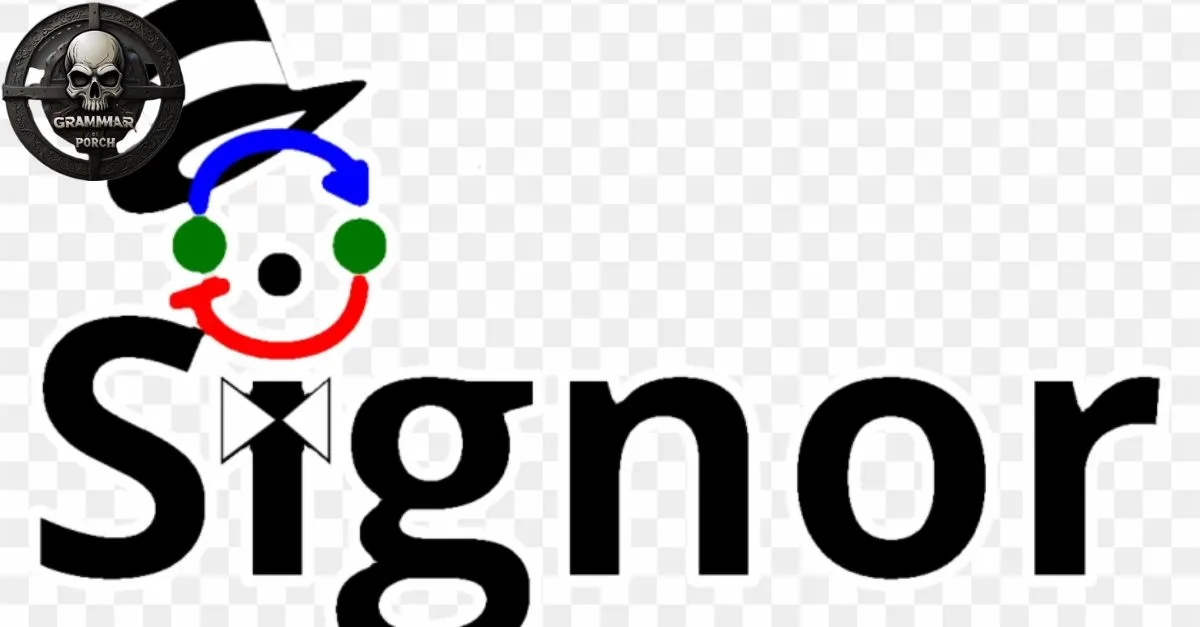The words signer and signor often confuse people because they sound similar but have very different meanings. While one refers to a person who signs something, the other is an Italian term of respect or a formal title of honor. In this article, we’ll explore the definitions, origins, and usages of these words to clear up any confusion. We’ll also provide helpful examples, tricks, and comparisons to help you remember the difference between signor vs signer easily.
Whether you’re discussing sign language or referring to a traditional Italian term, knowing which word to use is essential. Let’s dive into the details and settle the debate once and for all.
What Is the Confusion Between Signer or Signor?

The confusion between signor and signer arises mainly because they look and sound alike. However, they belong to entirely different contexts. A signer is someone who writes their name on a document, such as an agreement signer or a signature writer. In contrast, signor is an Italian address term meaning “Mister,” a cultural honorific used in formal or respectful settings in Italy.
For instance, in a legal contract, you’d refer to the signer role as someone signing the papers. But if you’re addressing an Italian man, you’d call him Signor Rossi, which is a formal Italian way of showing respect. Understanding these differences can help you avoid embarrassing mistakes in writing or conversation.
Is the Word Signer Correct?

Definition
The signer definition in the dictionary describes it as a person who signs their name, especially on documents like contracts, petitions, or legal forms. It also includes individuals who use sign language to communicate, such as a language interpreter or someone fluent in hand signs.
Meaning
A signer can be anyone responsible for endorsing an agreement or participating in signing communication. For example, in history, the agreement signer of important documents, like the Declaration of Independence, played critical roles. In a different context, sign language users also fall under this term, as they “sign” through gestures and symbols.
Usage
“Signer” is commonly used in legal, formal, and everyday scenarios. For example, “The contract requires a signature person to finalize the deal.” It also applies in communication, such as “The sign interpreter assisted the meeting attendees.”
Is the Word Signor Correct?

Definition
The word signor is a formal Italian title equivalent to “Mister” in English. The Sig. abbreviation is often used in Italian documents or correspondence as a shorthand for this traditional title.
Meaning
Signor conveys respect and is part of Italy’s rich tradition of honorific terms. It’s used in formal addresses, especially when referring to men. For instance, Signor Bianchi would translate to “Mr. Bianchi” in English, demonstrating a cultural address steeped in politeness.
Usage
“Signor” is mostly restricted to formal Italian contexts or literature. For example, “Good evening, Signor Rossi, how can I assist you?” It’s less common in casual settings, making it a cultural honorific reserved for special situations.
Quick Summary
| Word | Definition | Usage Examples |
| Signer | A person who signs something | Agreement signer, sign language user |
| Signor | An Italian title of respect | Formal Italian address like “Mr. Rossi” |
Signer or Signor as Parts of Speech
Signer is a noun used to describe a signature person or someone involved in signing agreements or documents. It’s commonly used in legal, professional, or everyday contexts to refer to individuals who authorize or validate documents. For example, a signer is someone who signs a contract or agreement.
On the other hand, signor is also a noun, but it functions as a cultural term used to address Italian men formally, much like “Mister” in English. It’s a term of respect and is often seen in Italian culture or when referring to Italians in a formal or respectful context. While both words are nouns, their contexts and meanings differ significantly, with signer being practical and signor being cultural.
Pronunciation of Signer or Signor

The pronunciation of signer and signor also helps set them apart. Signer is pronounced as /ˈsaɪnər/ (SIGH-ner), with the emphasis on the first syllable. It’s a straightforward, English-style pronunciation. On the other hand, signor is pronounced as /siːnˈjɔːr/ (seen-YOHR), with the stress on the second syllable and a distinct Italian flair.
The pronunciation of signor reflects its Italian origins, giving it a unique sound compared to the more familiar signer. This difference in pronunciation further highlights the distinction between the two words.
Side-by-Side Comparison: Signer or Signor
| Feature | Signer | Signor |
| Origin | English | Italian |
| Meaning | A person who signs | Respectful title for an Italian man |
| Context | Legal, communication, general use | Formal Italian contexts |
| Pronunciation | /ˈsaɪnər/ | /siːnˈjɔːr/ |
Which One Is More Acceptable: Signer or Signor?
For English speakers, signer is far more common and relevant in day-to-day use, especially in the U.S. It applies to situations involving contracts, sign language users, and communication aids. For instance, someone who signs an agreement or documents is a signer.
On the other hand, signor, as a formal Italian title, is mostly used in Italy or when referring to Italian culture. It is typically used to address men with respect, similar to “Mister.” While signer has broad usage, signor is more niche and cultural.
Common Mistakes and How to Avoid Them
One common mistake people make is using “signor” instead of “signer” in legal or everyday contexts. To avoid this, keep in mind that a signer is someone whose role involves signing documents, agreements, or using sign language for communication.
On the other hand, signor is exclusively tied to formal Italian titles, used as a respectful way to address men, similar to “Mister” in English. Understanding the distinct signer identity and signor’s cultural role ensures proper and accurate usage.
Trick to Remember the Difference Between Signer or Signor
Think of signer as someone who “signs” a document or communicates using sign language, making it easy to remember its practical use in legal and communication contexts. On the other hand, associate signor with “senior,” reflecting its role as a title of respect or a formal address in Italian culture.
This simple word association—signer for signing and signor for seniority and respect—can help you quickly distinguish between these similar-sounding terms and use them correctly.
Origins of Signer or Signor

Signer
The term signer traces its origins to Middle English, derived from the verb “sign,” which means to write one’s name or create a distinguishing mark. This word developed alongside the growing need for legal documentation and agreements in medieval society.
Over time, the role of a signer became associated with contracts, official papers, and other formal endorsements.
Signor
The word signor originates from the Latin term “senior,” which translates to elder or superior. It entered the Italian language as a formal title of respect, evolving into a polite way to address men, particularly in professional or traditional settings.
Synonyms of Signer or Signor
Signer
- Endorser
- Signature writer
- Contract signer
- Signing individual
- Agreement signer
- Autographer
- Signature person
- Witness
- Name writer
- Hand sign user
Signor
- Mister
- Gentleman
- Sir
- Sig. abbreviation
- Italian address term
- Senior
- Honorable
- Formal title
- Respectful address
- Cultural honorific
Sentences in Daily Usage of Signer or Signor

Signer
- The signer authorized the official documents.
- Each agreement signer must provide valid identification.
- The signature writer added their name to the petition.
- A contract signer plays a crucial role in legal processes.
- The signing individual was present during the meeting.
- A signature person confirmed the delivery receipt.
- The witness acted as a signer for the declaration.
- A signature writer is required for this financial transaction.
- The document needed an official signer to be validated.
- The sign language user acted as a communication bridge.
Signor
- Signor Rossi greeted the guests warmly.
- The invitation was addressed to Signor Mario Verdi.
- Using Signor shows respect in formal Italian contexts.
- Signor Giovanni was honored at the banquet.
- A respectful tone is vital when addressing someone as Signor.
- The formal Italian title reflects a traditional greeting.
- In Italy, Signor is equivalent to “Mister” in English.
- The receptionist said, “Good morning, Signor Lombardi.”
- Signor Carlo’s professionalism impressed the clients.
- The waiter politely addressed the man as Signor Franco.
FAQs
Are signor and signer interchangeable?
No, they have entirely different meanings.
What does signer mean in contracts?
It refers to the signature person or endorser.
Is signor commonly used today?
Only in formal Italian settings.
Can signer mean someone using sign language?
Yes, it includes sign language users.
What is the Italian abbreviation for signor?
It is Sig.
Conclusion
Understanding the difference between signer or signor is essential to avoid confusion. A signer refers to someone who signs documents, such as contracts or agreements, or communicates using sign language. It’s a practical term commonly used in legal, official, and everyday contexts. In contrast, signor is a cultural Italian term meaning “Mister,” a title of respect used in formal settings to address men politely.
While signer is widely used in English, particularly in the U.S., signor is specific to formal Italian traditions and rarely appears outside cultural references. Recognizing the context and meaning of each word ensures accurate and effective communication, whether you’re discussing agreements, interpreters, or addressing someone with respect.

Larry is an experienced blogger with a passion for simplifying grammar. With years of expertise in writing and language, he shares insightful tips on punctuation, synonyms, and the intricacies of English grammar at **Grammar Porch**. His approachable style helps readers improve their writing skills with ease.

